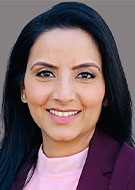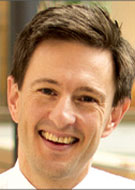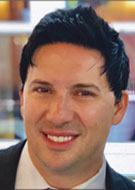Advance Your Career Using Social Media
Networking, speaking engagements and research assistance are a few of the benefits of engaging on social media



Shama Jaswal, MD, was preparing to apply for residency in diagnostic radiology when the COVID-19 pandemic hit. As an international graduate student working as a research assistant at the Mallinckrodt Institute of Radiology in St. Louis, opportunities to learn and expand her horizons were suddenly limited by lockdowns, canceled events and travel restrictions. But Dr. Jaswal quickly pivoted and found new opportunities in an unexpected place—Twitter.
“I wasn’t using Twitter professionally, but during the early days of the pandemic, it was the best way to get actively involved in the field,” Dr. Jaswal noted. “I started following attendings, residents and experts in the field. I joined conversations and offered to volunteer on projects and suddenly, the opportunities started coming in.”
Two of the most notable opportunities are her seat on the RadioGraphics Social Media Board, where she is one of 17 board members worldwide, and becoming first author of two RSNA 2021 abstract presentations. Dr. Jaswal also won the student category of the Medical College of Wisconsin (MCW) brain teaser quizzes held by the MCW Neuroradiology Department on Twitter.She claims that these opportunities wouldn’t have happened had she not established her brand on social media.
Dr. Jaswal’s sentiments were echoed by Alexander Towbin, MD, associate chief of radiology, clinical operations and radiology informatics at Cincinnati Children’s Hospital Medical Center. Dr. Towbin manages his department’s social channels and has often used the medium to find mentees, employees and speakers for events.
“Social media is a powerful tool for radiologists who are trying to be seen and find opportunities to advance their careers,” Dr. Towbin stated. “As I fill speaker or task force lineups, I often use social media to find people who are actively discussing topics that align with my agenda. It’s a great way to get your name out there, establish your interests and make connections that might not otherwise be possible.”
“Social media is a powerful tool for radiologists who are trying to be seen and find opportunities to advance their careers. As I fill speaker or task force lineups, I often use social media to find people who are actively discussing topics that align with my agenda. It’s a great way to get your name out there, establish your interests and make connections that might not otherwise be possible.”
ALEXANDER TOWBIN, MD
Develop Your Professional Brand
Regardless of where a radiologist is in their career, social media provides ample opportunity for advancement, whether it’s finding a new job, finding a mentor, securing a speaking engagement or amplifying your work to increase citations.
Bradley Spieler, MD, vice chair of scholarly activity and research in the Department of Radiology at the Louisiana State University (LSU) Health Sciences Center and University Medical Center in New Orleans, claims that the first step in creating your social media presence is setting a goal. This will help determine which channels to focus on. For instance, a resident trying to establish their own brand is likely going to focus on different social channels than someone who’s managing a department account and wants to educate patients or even other radiologists.
“If your goal is to educate, Instagram is the right platform,” Dr. Spieler said. “Twitter is definitely the place to promote yourself professionally and create a brand identity. In fact, we’re seeing more and more people gauge career advancement based on their Twitter engagement statistics. I’m also starting to see quite a few radiologists using TikTok to explain an image finding or procedure. At LSU, we’ve even had success using SnapChat as a teaching tool because we can time how long someone’s looking at an image before making a diagnosis.”
Dr. Towbin is seeing similar trends through his work.
“Twitter is the place to go for the nitty gritty research and department updates. People are sharing their research and promoting their work there, whereas Instagram is being used for teaching or sharing a case of the day,” Dr. Towbin said
FIND THESE SOURCES ON SOCIAL MEDIA
Follow Drs. Jaswal, Towbin and Spieler on social media.
Shama Jaswal
Twitter: @Jaswal_Shama
Alexander Towbin
Twitter: @towbinaj
Department Twitter and Instagram: @cincykidsrad
Bradley Spieler
Twitter: @bradleyspieler
Instagram: @lsu_dr_nola and @lsu_ir_nola
Grow Your Network and Confidence
Dr. Jaswal has focused her energies on Twitter and the platform has helped her establish her expertise because she’s able to find niche research and follow leaders posting about her specific subspecialty.
Through retweets, her profile description and content she’s posting, she’s able to communicate her interests clearly and quickly. Regularly sharing her work also gave her the confidence to take on new challenges.
“If you just believe in yourself and engage yourself professionally, you’ll get noticed, and you might be surprised at the validation and opportunities that come your way,” Dr. Jaswal claimed. “I never would have gained so much confidence if it weren’t for Twitter.”
Dr. Spieler also noted how junior faculty can gain confidence and fast-track their careers via social media.
“It used to be that you’d go to meetings, write papers and wait to be asked to speak or contribute,” Dr. Spieler recalled. “With social media, if you post often and regularly about a consistent topic, those opportunities come faster. In fact, you don’t have to wait for them to come at all—you can make them for yourself. I often advise junior faculty to create a presentation like they would for a conference and post it on social to make those opportunities happen.”
Just Get Started
It is important to remember what to avoid on social media. Criticizing other physicians or their specialty should be avoided. In addition, it’s important to make sure any images posted online have all their protected health information (PHI) removed. You also want to make sure if your social media accounts are affiliated with your institution, as opposed to your personal accounts, that your posts are acceptable through the standards of your institution.
Though it can feel intimidating to jump into the world of social media, Dr. Towbin recommends just diving in.
“You don’t necessarily need a big agenda,” Dr. Towbin explained. “Start as a lurker and follow a few people you’re interested in. Watch how people interact and jump in when you’re comfortable. Then start sharing articles you’re reading, interact with societies and grow your presence from there. And eventually, the career advancement opportunities will come.”
For More Information
Use the tips on the Social Media for Professional Growth infographic.
Read more about social media and career growth at: